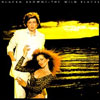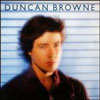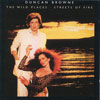

DUNCAN BROWNE : THE WILD PLACES / STREETS OF FIRE
-
The Wild Places
- The Wild Places
- Roman Vecu
- Camino Real [Pt. 1, 2 & 3]
- Samurai
- Kisarazu
- The Clash
- Planet Earth
Streets Of Fire - Fauvette
- American Heartbeat
- She's Just a Fallen Angel
- Streets of Fire
- Nina Morena
- Things To Come
- (Restless) Child of Change
Label : Castle Music
Length : 76:54
Released : 1978 (The Wild Places) / 1979 (Streets Of Fire)
Review The Wild Place (AllMusic) : Following his stint in the group Metro with Sean Lyons and Peter Godwin, Duncan Browne turned up in 1978 with his first solo album since the dawn of the '70s. The Wild Places isn't much like his Immediate album Give Me, Take You - indeed, it's more like a lost Roxy Music album, or perhaps a lost Bryan Ferry record. It's electric, and the music has a sense of drama as well as beautiful melodies that were even better realized, with lush contributions on the synthesizer and related keyboards by Tony Hymas and a fierce guitar sound courtesy of Browne himself, aided by the upfront presence of John Giblin and Simon Phillips on bass and drums, respectively. The music runs the gamut from edgy progressive rock to straight-ahead rock & roll (the latter highlighted by "The Crash"), though Browne was at the top of his game, as both a singer and composer, working in an introspective, romantic vein, as on the killer title cut and numbers like "Roman Vecu" and "Kisarazu." Long out of print in the United States, The Wild Places was reissued on CD during late 2000 in Japan.
Review Streets Of Fire (AllMusic) : Duncan Browne's second late-'70s album was even better than its predecessor, or at least the first half of it was - the music on side one more easily accommodates his melodies and a rocking beat, and the influence of progressive rock is largely muted, subsumed into Tony Hymas' synthesizer work. Browne wrote some of the prettiest music of his career (and that is saying something) for this album's first side, and as a producer he knew exactly how to get the most out of it, bringing in saxman Dick Morrisey for "Fallen Angel"; his guitar playing also achieved new heights of virtuosity on the riveting title cut, an instrumental that, at times, resembles a coherent jam by the mid-'70s-era King Crimson. Side two is slightly less engaging, as though he ran out of really first-rate material, and has fewer memorable melodies. Reissued on CD in Japan in late 2000.
